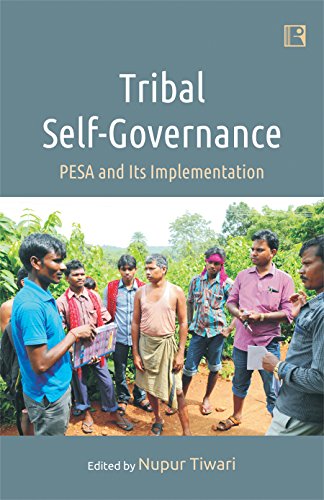EDITED BY NUPUR TIWARI (2 Ergebnisse)
Produktart
- Alle Produktarten
- Bücher (2)
- Magazine & Zeitschriften
- Comics
- Noten
- Kunst, Grafik & Poster
- Fotografien
- Karten
-
Manuskripte &
Papierantiquitäten
Zustand
- Alle
- Neu
- Antiquarisch/Gebraucht
Einband
- alle Einbände
- Hardcover
- Softcover
Weitere Eigenschaften
- Erstausgabe
- Signiert
- Schutzumschlag (1)
- Angebotsfoto
- Kein Print-on-Demand
Land des Verkäufers
Verkäuferbewertung
-
Tribal Self-Governance: PESA and its Implementation
Verlag: Rawat, 2016
ISBN 10: 8131607542ISBN 13: 9788131607541
Anbieter: Vedams eBooks (P) Ltd, New Delhi, Indien
Buch Erstausgabe
Hardcover. Zustand: New. 1st Edition. After Independence, Constituent Assembly of India has taken several steps to protect the interests of the vast tribal population of India. Based on the Bhuria Committee Report, the PESA (Panchayat Extension to Scheduled Areas) Act was passed by the Parliament keeping in view the welfare and socio-economic development of the tribals. The PESA Act gives radical governance powers to the tribal community and recognizes its traditional community rights over local natural resources. This Act has also made it mandatory for the states having Scheduled Areas to make specific provisions for giving a broad range of powers to the tribals on matters relating to decision-making and development of their community. However, actual implementation of the provisions lies with the states. It was expected that the PESA would lead to self-governance and empowerment of the people, but the implementation of PESA is far from satisfactory. This book is an attempt to grasp the profound impact of effective implementation of PESA, with special emphasis on the extremist affected districts which are characterized by a high degree of poverty, lack of infrastructure, illiteracy, exploitation and marginalization. Through various case studies, the book tries to discuss the diverse issues and concerns relevant for people-centric governance for removing the discontent among the tribal population and assuring them that they have equal stake in the progress of the country. This book will contribute to enhancing our understanding of PESA and add to the experience in designing inclusive and accountable local representative institutions. The book will be useful not only for policy makers but also for those who contribute to broader national and regional debates on addressing these common challenges.
-
MGNREGA and Gender Equity
Verlag: Kanishka, 2015
ISBN 10: 818457682XISBN 13: 9788184576825
Anbieter: Vedams eBooks (P) Ltd, New Delhi, Indien
Buch Erstausgabe
Hardcover. Zustand: New. Zustand des Schutzumschlags: New. 1st Edition. Contents: Foreword. Introduction. 1. Barriers to women s participation in MGNREGA: a case study of Sonipat and Mahendergarh Districts of Haryana State/Manju Panwar and Jitendra Kumar. 2. Problems of women labour under MGNREGS/Suesh Chandra Ch. 3. Empowerment of rural women through MGNREGS/Santhosh Areekkuzhiyil and K. Prajisha. 4. Critical study of MGNREGA: its impact and women s participation in Bihar, Rajasthan, Uttar Pradesh, Sikkim and Madhya Pradesh/Tabish Samdani and Shri Soumya Kapoor. 5. Various impediments of women s participation in MNREGA/Ved Pal Singh Deswal. 6. Critical gender concerns in MGNREGA/Sharmistha Sinha and Kavita. 7. Impact of NREGA on women: a case study of Berachampa Gram Panchayat, Dist: North 24-Parganas,West Bengal/Notan Bhusan Kar. 8. Women participation in MGNREGA: A study of Tehri Garhwal District of Uttarakhand/A.K. Pokriyal and Rakha Rani. 9. Women participation in Mahatma Gandhi National rural employment Guarantee act: issues and challenges in Bundelkhand region of Central India/B.Pradhan, Jitendra K. Verma. 10. Determinants of women job participation in MGNREGA scheme-case study of Burdwan District in West Bengal/Krishna Singh, Soumyendra Kishore Datta . Mahatma Gandhi National Rural Employment Guarantee Act (MGNREGA) has made significant achievements with regard to mobilisation of women wage workers, gender parity of wages and increased control of women on their earnings. There has been acceptability from large sections of society that MGNREGA has provided better working conditions, less exploitative work culture and of course better wages for women, though not conceived on gender lines. Schedule II of the paragraph six of the act emphasizes on the word Priority which is evident of gender mainstreaming. As the text denotes that priority should be placed on women in the allocation of work in such a way that at least one third of the beneficiaries shall be women . The book tries to address the underlying premise by deliberating on some thematic concerns and initiatives taken through MGNREGA to encourage women participation and striking gender equity in the field of rural employment. It discusses the various issues and concerns relevant for gendered participation in such schemes and the significant changes that they have brought about. This is an attempt to identify major constraints on women s access to productive employment opportunities through the employment guarantee program. The book is an effort to reach out to the wider public with ideas that call for action and to generate the dynamics of discourse to bring about a major transformation in the larger development paradigm. (jacket).



